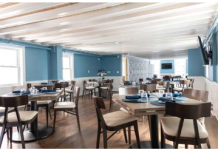By Linda McK.Stewart
“Don’t let schooling interfere with your education.”
So spoke America’s favorite humorist, Samuel Clemens (1835-1910) who took Mark Twain as his pen name. Although his output was voluminous, much of it still in print, it’s surely The Adventures of Tom Sawyer and The Adventures of Huckleberry Finn for which he’s most affectionately remembered.
“Classic…a book which people praise and don’t read…”
What a delicious irony that Tom and Huck, two 13-year-old free spirits, roaming the banks of the Mississippi River with nary a nickel between them, were brought to life far, far away on the third floor of an elegant mansion in Connecticut. In their wildest dreams neither Tom nor Huck could ever have imagined the elegance of their birthplace.
The sixth of seven children, Sam Clemens was born into rural, Midwestern poverty. His early years as a newspaperman were only modestly rewarded.
“Supposing is good but finding out is better.”
At the age of 35 he married the wealthy Olivia Langdon, 10 years his junior, a bride well able to afford the house of her (if not his) dreams. Fortunately that house at 351 Farmington Ave., Hartford, Conn., where the Clemens family spent 17 happy years, still stands, open to the public and lovingly restored to its 19th century grandeur.
“Soap and education are not as sudden as a massacre, but they are more deadly in the long run.”
By anyone’s standards the house is an impressive structure of porches, chimneys, balconies, turrets and oversize windows. “Excessive,” sniffed the neighbors, though to my eye, “exuberant” is a better fit. A wide porch runs the full length of the front, an ideal rainy day playground for Hash, the family mutt and Suzy, Jean and Clara, the three Clemens children. (An infant son, Langdon, died the year Suzy was born.)
Visitors enter through an oversize front door which opens into an oversize front hall. Its walls are meticulously painted in a trompe l’oeil fashion to suggest hand-carved inlay. In a closet off the hall hangs one of New England’s very first phones. Made of wood, Sam Clemens termed it “a wild extravagance, a splendid toy.”
“Habit is … not to be flung out of the window … but coaxed downstairs a step at a time.”
Both the dining room and the drawing room with their dark wood paneling, oriental rugs and heavy velvet curtains could have been lifted from any handbook of proper Victorian interiors. It was in the drawing room, his elbow on the mantelpiece that the author entertained guests singing Swing Low Sweet Chariot, Go Down Moses and other favorites of his Missouri boyhood. Beyond the drawing room is the library off which is a glass-enclosed conservatory. Here flowering plants and “table greens” were cultivated, surely a much appreciated luxury during the long New England winters.
A fireplace graces each of the upstairs bedrooms, most of them complete with their original furnishings. The nursery, across the hall from the master bedroom, doubled as a schoolroom. Despite the one-room schools of his boyhood, Clemens insisted the children be taught at home by a tutor. Toys, scrapbooks and a hand-carved Noah’s Ark, passengers included, crowd the shelves.
“Familiarity breeds contempt and children.”
Space reserved for Sam Clemens’ writing was relegated to a third floor room where Tom and Huck, among others, were brought to life. Its furnishings are minimal: A billiard table and a writing desk. When his powers failed at one, he turned to the other. Above the desk hangs an inscription in Clemens’ own hand:
“After writing for 15 years it struck me that I had no talent for writing but I couldn’t give it up. By that time I was already famous.”
It was in his third floor sanctuary, away from Livy’s reproachful gaze, that Sam Clemens indulged his taste for liquor and tobacco. Without his pipe and bottle, he said, the creative juices ran dry. Although Tom and Huck sent the pen name Mark Twain around the world, neither character appealed to Olivia Clemens. She felt that the entire Mississippi River scene, with its raggedy drunks and drifters, its hayseed style of life were unworthy of her husband’s talents. She deemed it all too vulgar, too common by half. More to her liking, and to his daughters’ as well, was The Prince and the Pauper and other books reflective of their extensive trips through Europe.
“Nothing so needs reforming as other people’s habits.”
But friends who knew him best, agreed that his heart remained forever with the vast world of the wondrous Mississippi River.
The house and its maintenance proved ruinously expensive. It required a full-time staff of six. Seventeen years after moving in, the family, beset by severe business losses, sold it and moved their household to Europe.
Guided tours usher thousands of visitors from all over the world through the house all year round. True to the spirit of the man who lived there, writing classes, plays and lectures are offered in the newly built museum adjacent to the house.
IF YOU GO: For further details, call 860-247-0998 or www.marktwainhouse.com














